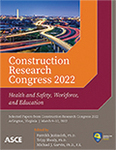Evaluating the Effectiveness of Extracurricular Online Workshops on Student Learning in Construction
Publication: Construction Research Congress 2022
ABSTRACT
Online courses allow for flexible learning opportunities critical to providing educational experiences to keep students engaged with their field of study. In this study, a virtual workshop was delivered to students with little-to-no knowledge of construction scheduling in a one-hour session. Eighty-seven students participated in the workshops. The participants were primarily undergraduate students enrolled in civil engineering, civil engineering technology, construction, and architecture programs. A Quasi-experimental approach was employed in this study, and pre- and post-workshop tests were administered to assess the effectiveness of the sessions, including the workshop learning outcomes. This paper discusses the workshop’s effects on student learning outcomes by analyzing data from the pre- and post-workshop tests based on specific demographics, including gender, cumulative GPA, and students’ prior construction and scheduling experience. This study also evaluates student performance based on the level of difficulty of the questions asked. The Wilcoxon Signed-Rank test to compare students’ pre- and post-workshop answers to each scheduling question showed statistically significant improvements in all of the post-workshop answers regardless of the level of difficulty of the questions and the learning outcomes.
Get full access to this article
View all available purchase options and get full access to this chapter.
REFERENCES
Abraham, Y. S., Çelik, B. G., Spaan, M. F., and Mansson, N. (2021). Assessing the Effectiveness of Active-learning Approaches in Advancing Student Understanding of Construction Scheduling in a Virtual Environment. In 2021 ASEE Virtual Annual Conference Content Access.
Anderson, T. (1997). Integrating lectures and electronic course materials. Innovations in Education and Training International, 34(1), 24–31.
Asgari, S., Trajkovic, J., Rahmani, M., Zhang, W., Lo, R. C., and Sciortino, A. (2021). An observational study of engineering online education during the COVID-19 pandemic. Plos one, 16(4), e0250041.
Baldwin, R. S., Peleg-Bruckner, Z., and McClintock, A. H. (1985). Effects of topic interest and prior knowledge on reading comprehension. Reading research quarterly, 497–504.
Becerra, Z. M., Fereydooni, N., Kun, A. L., McKerral, A., Riener, A., Schartmüller, C., Walker, B. N., and Wintersberger, P. (2021). Interactive Workshops in a Pandemic: The Real Benefits of Virtual Spaces. IEEE Pervasive Computing, 20(1), pp.35–39.
Burke, K., Greenbowe, T. J., and Gelder, J. I. (2004). The multi-initiative dissemination project workshops: who attends them and how effective are they? J. Chem. Educ., 81, 897.
Carini, R. M., Kuh, G. D., and Klein, S. P. (2006). Student engagement and student learning: Testing the linkages. Research in higher education, 47(1), 1–32.
Cheryan, S., Meltzoff, A. N., and Kim, S. (2011). Classrooms matter: The design of virtual classrooms influences gender disparities in computer science classes. Computers & Education, 57(2), 1825–1835.
Connolly, M. R., and Millar, S. B. (2006). Using workshops to improve instruction in STEM courses, Metropolitan Universities, 17, 53–65.
Gagné, R. M. (1974). Learning for instruction. Illinois: The Dryden Press Hinsdale.
Gagné, R. M., Wager, W. W., Golas, K. C., Keller, J. M., and Russell, J. D. (2005). Principles of instructional design. 5th ed. Cengage Publishers.
Gauvreau, S., Hurst, D., Cleveland-Innes, M., and Hawranik, P. (2016). Online professional skills workshops: Perspectives from distance education graduate students. International Review of Research in Open and Distributed Learning: IRRODL, 17(5), 91–108.
Hu, W. C., Bansal, B., and Kaabouch, N. (2020). Using Mobile and Wireless Computing to Facilitate Virtual Collaboration During a Pandemic. Systemics, Cybernetics, and Informatics, 18(1) 273–288.
Kent, F., George, J., Lindley, J., and Brock, T. (2020). Virtual workshops to preserve interprofessional collaboration when physical distancing. Medical education, 54(7), 661–662.
Kinsella, G. K., Mahon, C., and Lillis, S. (2017). Using pre-lecture activities to enhance learner engagement in a large group setting. Active Learning in Higher Education, 18(3), 231–242.
Lewis, S. E., and Lewis, J. E. (2006), Effectiveness of a workshop to encourage action: evaluation from a post-workshop survey, J. Chem. Educ., 83, 299.
Little-Wiles, J., Fernandez, E., and Fox, P. (2014, October). Understanding gender differences in online learning. In 2014 IEEE Frontiers in Education Conference (FIE) Proceedings (pp. 1–4). IEEE.
McSporran, M., and Young, S. (2001). Does gender matter in online learning?. ALT-J, 9(2), 3–15.
Milovanović, A., Kostić, M., Zorić, A., Đorđević, A., Pešić, M., Bugarski, J., Todorović, D., Sokolović, N., and Josifovski, A. (2020). Transferring Covid-19 challenges into learning potentials: Online workshops in architectural education. Sustainability, 12(17), 7024.
Pezzullo, L. G., Wiggins, J. B., Frankosky, M. H., Min, W., Boyer, K. E., Mott, B. W., Wiebe, E. N., and Lester, J. C. (2017, June). “Thanks Alisha, Keep in Touch”: Gender Effects and Engagement with Virtual Learning Companions. In International conference on artificial intelligence in education (pp. 299–310). Springer, Cham.
Sabbaghian, Z., and Mir, M. L. (2004). The Effectiveness of Educational Workshops: a case study. Journal of research and planning in Higher Education, 10(33).
Stump, G. S., Hilpert, J. C., Husman, J., Chung, W. T., and Kim, W. (2011). Collaborative learning in engineering students: Gender and achievement. Journal of engineering education, 100(3), 475–497.
Swing, S. R., and Peterson, P. L. (1982). The relationship of student ability and small-group interaction to student achievement. American Educational Research Journal, 19(2), 259–274.
Terry, N. (2000). The effectiveness of virtual learning in economics. Journal of Economics and Economic Education Research, 1, 93–99.
Tobias, S. (1994). Interest, prior knowledge, and learning. Review of Educational Research, 64(1), 37–54.
Yang, S. C., and Liu, S. F. (2004). Case study of online workshop for the professional development of teachers. Computers in Human Behavior, 20(6), 733–761. DOI: https://doi.org/10.1016/j.chb.2004.02.005.
Zou, P. X. W. (2007) A Longitudinal Study of E-learning for Construction Management Education, Journal for Education in the Built Environment, 2(2), 61–84, DOI: https://doi.org/10.11120/jebe.2007.02020061.
Information & Authors
Information
Published In
History
Published online: Mar 7, 2022
Authors
Metrics & Citations
Metrics
Citations
Download citation
If you have the appropriate software installed, you can download article citation data to the citation manager of your choice. Simply select your manager software from the list below and click Download.
